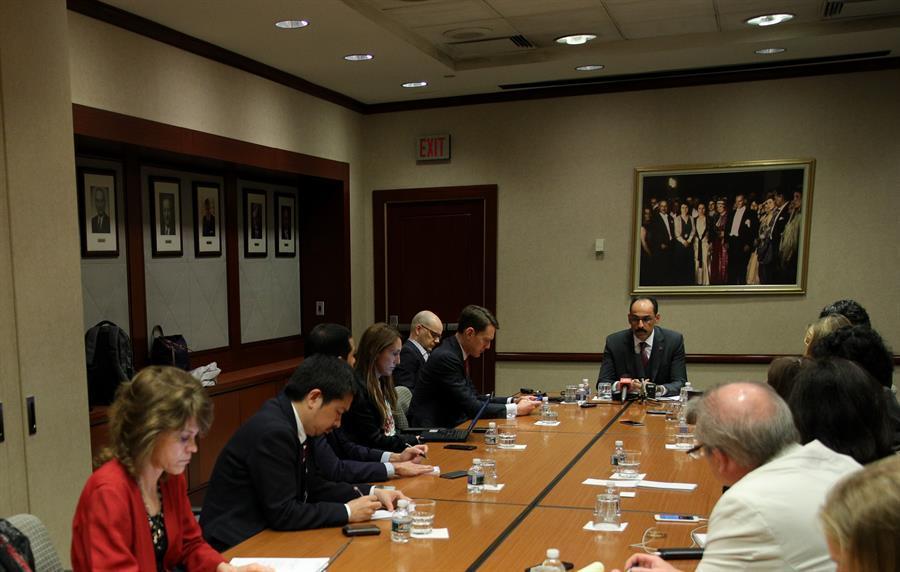S-400 technical committee still on table: Presidential spokesperson
WASHINGTON- Anadolu Agency

Turkey's proposal to form a committee to examine technical concerns about its procurement of an advanced Russian missile defense system is still under consideration, its presidential spokesman said on April 16.
"And our proposal to establish this technical committee under the NATO umbrella is still on the table. We are waiting to hear from our U.S. colleagues and from NATO," İbrahim Kalın told reporters at the Turkish embassy. "Because we wouldn't want to have our F-35 program jeopardized in any way by the S-400 or any other system."
Tensions between the U.S. and Turkey have reached a fever pitch in recent months with Turkey set to begin receiving the advanced S-400 Russian surface-to-air missile system that Washington said will jeopardize Turkey's role in the F-35 fighter jet program and which could trigger congressional sanctions.
The U.S. already suspended deliveries of parts and services related to Turkey's receipt of the multi-million dollar fighter jets.
Following protracted efforts to purchase an air defense system from the U.S. with no success, Ankara decided in 2017 to purchase the Russian S-400 system.
U.S. officials advised Turkey to buy the U.S. Patriot missile system rather than the S-400s from Moscow, arguing that the Russian system would be incompatible with NATO systems and expose the F-35 to possible Russian subterfuge.
Turkey, however, has emphasized that the S-400 would not be integrated into NATO systems and would not pose a threat to the alliance.
Kalın stressed that Turkish experts have said the S-400 would not "jeopardize" the F-35, reiterating that Ankara wants to remain part of the F-35 program.
In addition to facing possible expulsion from the F-35 program by the U.S., Turkey is also likely to face sanctions under a 2017 sanctions law should it take delivery of the S-400 system.
Should that happen, Kalın said, Turkey expects President Donald Trump to issue a waiver to exempt Ankara from any economic penalties.
Likewise, Kalın said, Turkey expects the Trump administration to extend an existing sanctions waiver that is set to expire at the end of May to allow Turkey to continue importing Iranian oil.
Turning to a safe zone being mulled for northeastern Syria, Kalın said the U.S. and Turkey "are making progress," noting "positive signals" being received from Washington on the matter, but stressed the U.S. needs to end its support to the YPG, the Syrian affiliate of the PKK- a designated terror group in the U.S. and Turkey.
"The U.S. needs to have a change of course there because we don't need the PYD/YPG to establish peace and security in any part of Syria," Kalın said, using a name for the group that includes its political wing.
Turkey will not accept statements that question its status in NATO, Kalın also said in an interview with Anadolu Agency and dismissed comments aimed at Turkey's membership in NATO amid a row with the U.S. over the purchase of S400.
Earlier this month, U.S. Vice President Mike Pence said Turkey's purchase of the S-400 system could potentially pose a risk to NATO.
"Turkey must choose. Does it want to remain a critical partner in the most successful military alliance in the history of the world, or does it want to risk the security of that partnership?" Pence said.
Kalın said it is not possible for Turkey to accept such statements, adding it is not a single country that will determine the status of a country in NATO but all NATO member countries.
"Besides, we are not an observer [country] there. We are one of the members. We are a country that has a say in all decisions," he said. "Therefore, we will not allow the questioning of Turkey's position in NATO."
In the meantime, friendship was reiterated on April 16 by the Turkish ambassador to the U.S. to describe Ankara's current relationship with Washington.
Serdar Kılıç, who has served as ambassador to the U.S. since 2014, called on both nations to "defend, protect, and further strengthen" ties.
"We are friends and friendship needs care. We cannot take it lightly. Turkey needs the United States. But I can assure you that the United States also needs Turkey," Kılıç said at a conference on American-Turkish relations in Washington.
"Turkey is ready to proceed with the purchase of Patriot missiles if we can reach a satisfactory deal in the ongoing negotiations," he added.
The U.S. and Turkey are seeking to boost bilateral trade more than three-fold to $75 billion from just over $20 billion, Turkey's trade minister said on April 16.
Part of the effort is planned to include a tariff-free high-tech cooperation zone in Turkey, Ruhsar Pekcan told a gathering of business leaders in the U.S. capital.
















